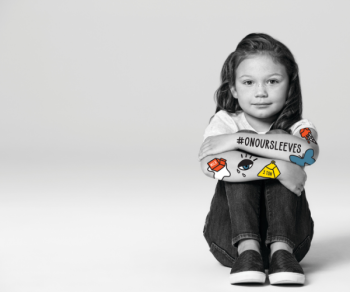5/1/24 blog post
practical parenting strategies for raising resilient kids

In this article:
- Defining resilience
- Three ways to build resilience in your child
- Conversation starters for building resilience
- More resources from On Our Sleeves
Is everyone telling you that you should “raise a resilient kid?” Popular culture and social media seem to be constantly emphasizing the importance of raising a resilient kid, but it’s hard to know what sources to trust when there’s a nonstop overflow of information.
Resilience is an important part of a child’s development and growth. When we raise resilient children, we can help them to become resilient adults who are able to overcome challenges. And resilience works hand and hand with emotional wellbeing. When we are resilient, we have emotional wellbeing, and emotional wellbeing makes us resilient as we use the tools in our “emotional wellbeing toolkit” to navigate life’s challenges that will inevitably come.
Read on to learn more about resilience, and how you can raise resilient kids!
what is resilience?
Resilience is the ability to adapt and cope during tough times. It is the ability to work through challenges and grow from life experiences.
Being resilient does not mean that we will never go through hard times or feel negative emotions; it is simply about having the ability to handle these challenges and adapt.
Our goal as parents is to raise successful resilient children so that they become successful resilient adults. We need to encourage and support their journey through navigating challenges to promote emotional well-being.
Kenneth R. Ginsburg, pediatrician and children’s mental health expert says, “We all want our children to be happy, but we need them to be resilient. We wish we could guarantee a future for them with bountiful opportunities and manageable bumps. Because we lack this control over the future, we must prepare our children to successfully handle both good and challenging times.”
3 essential elements for raising resilient kids
Now that you know what resiliency is, and how important it is to children’s emotional wellbeing, here are some practical tips from our children’s mental health experts on developing this quality more in your child!
1. Love them unconditionally
When children know they are loved for who they are, they develop more confidence to try new things.
- Tell your children that you love them. Don’t assume that they know.
- Remind them that you love them even when they make mistakes.
- When they misbehave, tell them that you love them, but their behavior is not okay or acceptable.
- Help them to see that there are many parts to who they are, not just one focus. For example, you can praise them for being an amazing soccer player AND a kind and caring friend. Or you can remind them that they are a good student AND they enjoy playing music.
- Praise the efforts that they make more than you praise the end result of what they do.
- Show support in their interests, even if they are different than yours.
Conversation starter: What are some ways that you can tell that I love you?
2. Allow them to fail…safely
It is important to let our kids fail, so they can build skills to deal with failure. Kids learn more from making their own mistakes than from someone else telling them what not to do. And it is easier for kids to make mistakes when they are younger than when they are adults and have no one to intervene when there are consequences.
- Allow your child to fail and learn a lesson, for example: If they have waited until the last minute to complete a school project do not intervene. Hopefully they will remember the stress and poor quality that resulted from their mistake and this lesson will carry over to the next time when they have a big report due!
- Avoid encouraging your child to perform well to please us. For example, encourage your kid to practice for their piano recital, game, test, or play so that they feel confident. Avoid putting expectations you're on them to perform perfectly. Remind them that they are loved and respected unconditionally.
*Important note: always intervene when their physical or emotional health is at risk. (Example: trying out for an activity that they have no knowledge about the basic skills involved).
Conversation starter: What was challenging about the (test, game, activity)?
3. Provide guidance and support while promoting independence
One day, our children will be on their own to face life’s challenges. We can build their confidence ability to bounce back from disappointments by using their childhood years as a time to provide guidance, while encouraging them to try things on their own!
- Provide opportunities for your child to be independent by teaching them to do simple age-appropriate tasks. Some examples of age-appropriate tasks are carrying their own sports bag, making their bed, learning how to make a sandwich and following a chore chart.
- Teach, practice, and give opportunity for them to problem solve situations.
- Talk about the importance of seeing things from other people’s perspectives and how to respectfully communicate their own perspective.
- Practice guiding their decision making instead of deciding for them when they are given a choice.
- Create room for your child to reflect on the possible results of their decisions.
- Praise them for appropriate independent efforts!
Conversation starter: Tell me how you feel about how you handled a difficult situation recently.
conversation starters for building resilience
- What are some ways that you can tell that I love you?
- What was challenging about the (test, game, activity)?
- Tell me how you feel about how you handled a difficult situation recently.
continue learning...
Continue on your emotional wellbeing journey by going to the next topic! Just click the button below.
how to encourage positive connections
return to the emotional wellbeing learning hub
more resources from On Our Sleeves
If you're looking for access to even more resources to help you on your journey to supporting children's mental health, you'll want to become a part of the On Our Sleeves e-community! Our mission is to get our free, expert-created resources to as many caring adults in our communities so that everyone can understand and promote mental health for children.
Join us on this mission, by clicking the orange button below! You'll be signed up to start receiving monthly free content and resources to help you support the mental wellness of children in your life and break the stigma surrounding mental health. You'll also be the first to know about special giveaways like our Activity Book and Conversation Starter Cards!



